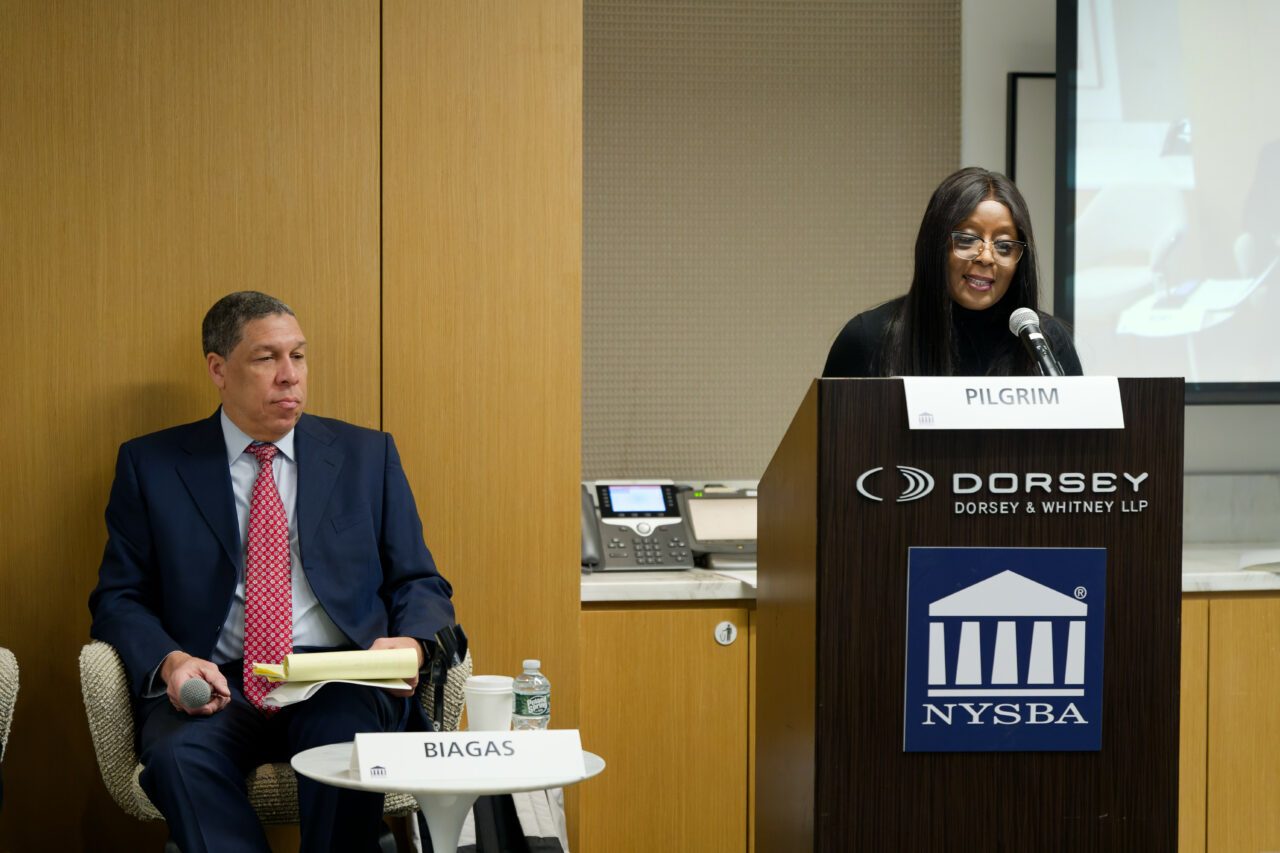Communication, Relationships, Trust Are Key to Successful Negotiations
1.20.2023
Communication, relationships, and trust are key components to successful negotiations, according to three panelists from the sports world and a former FBI hostage negotiator who spoke at the Entertainment, Arts & Sports Law Section panel “Approaches to Negotiations in Sports, Entertainment, and Other Universes,” which was held during the New York State Bar Association’s Annual Meeting in New York City.
Those characteristics apply across a broad spectrum that encompass a professional athlete’s contract, a media rights deal, a stadium sponsorship, and a hostage negotiation.
Daniel Etna, partner and co-chair of the Sports Law Group at Herrick Feinstein; Arthur McAfee III, senior vice president, football operations, National Football League; Maggie Ntim, founder and international sports agent of Trinity 3 Agency; and Gary Noesner, retired chief of the FBI’s Crisis Negotiations Unit, spoke on the importance of being prepared and understanding the needs of both sides.
Pam Lester, co-chair of the section’s sports law committee, moderated the panel.
“The first things we try to establish is what the goals are? What is that we are trying to achieve on behalf of the players or the ownership group,” said McAfee.
Ntim expanded on that thought through her own experience representing athletes.
“Advocating for the athlete. There’s a lot of preparation that goes into it, especially when I’m dealing with women from the National Women’s Soccer League. I’m always trying to help them out and consider a lot of different things such as health benefits. Some contracts I’ve seen didn’t even mention anything about that until only recently within the new collective bargaining agreement. You are now looking at opportunities in terms of maternity leave. These women have been playing for years and that was never an option.”
The same holds true for dealing with a hostage crisis, according to Noesner, who said there is a lot more preparation than people assume.
“For example, if we know we’re going to a siege with right wing militia folks, we know basically the ideology and some of the driving philosophy behind their behavior,” said Noesner.
He added it helps that the FBI has an expertise about human behavior and that it is important the negotiator has self-control.
“If you cannot control your own emotions, how can you begin to influence those of others? Can we avoid acrimonious interaction? Can we be patient and thoughtful and be good listeners to gather information?”
It is also important to ensure a client is fully briefed. Etna spoke about the importance of negotiating internally before doing so externally. He noted how someone may be looking to purchase a professional sports team but may not understand the process, especially when it comes to league approval.
“It merits careful consideration when you’re advising somebody as to whether they’re going to pass muster in terms of being approved by the league. It’s more than being of moral fiber and background, it’s the finance wherewithal given the cost in the sports industry today.”
Noesner said that this is where trust and relationships come into play.
“We have a tendency to want to get down to business a little bit too quick. Quite often in my experience we don’t pay sufficient attention to relationship building, which is really the key to everything.”
He recounted a story he recently saw about a social science project that concluded that the greatest key to happiness is having good solid relationships in your life.
“Well, that’s certainly true in negotiations. This might be the first time we’re seeing somebody and it’s not exactly a pleasant experience, but if we can craft the relationship where this individual comes to believe we’re genuine and we’re sincere. We’re not going to make a bad day worse because we’re believable, we’re reliable and we’re dependable. I don’t know that you can place enough value on those things, and they come across, not just in words but in our demeanor and our approach.”
“I would say that on the management-labor side, given the general tension that exists between management and labor, the key to success is really about relationships, and as they say in labor relations, the keyword is relations because it’s an ongoing contract and communication with the other side,” said Etna.
Another component that comes into negotiations is the role of the press. Sports and prominent incidents such as hostage negotiations or kidnappings draw the public’s interest, which makes trust a paramount characteristic when dealing with the press.
“I would say that in our space trust comes into play because anything you say is easily verifiable. If I put a number out there and attribute it to a player, the press can go look at that number up right away. Salaries are shared and the clubs know what they’re paying their players,” said McAfee. “They kind of know what the landscape is in terms of compensation. There has to be trustworthiness in order for the press to want to continue to deal with you.”
Ntim added one of the biggest challenges in dealing with the press is the continuous news cycle, the presence of social media, and the need to respect the processes clubs have to adhere to by their respective leagues.
“As for the negotiating table, sometimes dealing with the press can be very interesting. I use social media a lot, so a lot of media folks will reach out and send me a DM and I can’t comment because anything I say, I’m going to be quoted on. So, I just try to wait until after everything is done and wait on the club to put out an announcement. There’s a process in place and so it’s better to just follow the protocol.”
An audience member asked how much intuition comes into play during negotiations.
“I think that the advantage for us in this space is that it is very confined. You start with the proposition that the people you’re working with know the business, and in that space it becomes intuitive in terms of what to expect from the other side based upon your role play participation,” said McAfee. “And I’m just trying to understand that if you were to flip the roles, how would you react? And what would you negotiate? I think that’s how we work through and anticipate those kinds of kinds of things.”
Another question posed was whether you act differently in a one-off negotiation when you’re probably never again going to see the person on the other side of the table.
“I don’t think you can assume you’ll never interact with someone again. I think you must be true to yourself with demonstrated consistent ethical behavior,” said Noesner.
“You know the sports industry is such a small world and you just never know if you’re going to run into that person again. So, you should always remain professional and respectful because at the end of the day your image and your reputation are everything in the business, so you just always want to remain true to who you are,” said Ntim.





